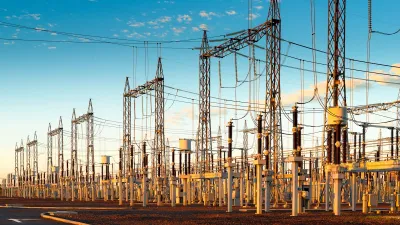A series of proposed bills seeks to limit ratepayer increases and ensure data centers report their energy usage and electricity sources.

California lawmakers are proposing a series of bills to protect ratepayers from electricity rate hikes prompted by data centers, which use high amounts of energy, reports Khari Johnson for CALmatters. The amount of energy used by data centers has tripled in the last decade and could double or even triple again by 2028, curbing states’ efforts to reduce greenhouse gas emissions.
“One measure, from Democratic Assemblymember Rebecca Bauer-Kahan of San Ramon, would require data centers and the developers of large AI models to publicly share how much energy they use. It would also make state energy regulators adopt efficiency standards for data centers.” Another bill would require utilities to create a rate structure specific to data centers, while yet another would incentivize the creation of jobs and zero-emission power sources.
“Just as increased traffic on roads leads to congestion and delays, the addition of large data center loads to the power grid can, in theory, drive up overall electricity demand and exacerbate transmission congestion, said UC Riverside professor Shaolei Ren, who studies the environmental impact of data centers.” Increased greenhouse gas emissions also contribute to higher health care costs and deaths. One study from the California Institute of Technology and UC Riverside estimates that data center emissions could contribute to roughly 1,300 premature deaths by 2030.
FULL STORY: Crackdown on power-guzzling data centers may soon come online in California

Planetizen Federal Action Tracker
A weekly monitor of how Trump’s orders and actions are impacting planners and planning in America.

Map: Where Senate Republicans Want to Sell Your Public Lands
For public land advocates, the Senate Republicans’ proposal to sell millions of acres of public land in the West is “the biggest fight of their careers.”

Restaurant Patios Were a Pandemic Win — Why Were They so Hard to Keep?
Social distancing requirements and changes in travel patterns prompted cities to pilot new uses for street and sidewalk space. Then it got complicated.

Platform Pilsner: Vancouver Transit Agency Releases... a Beer?
TransLink will receive a portion of every sale of the four-pack.

Toronto Weighs Cheaper Transit, Parking Hikes for Major Events
Special event rates would take effect during large festivals, sports games and concerts to ‘discourage driving, manage congestion and free up space for transit.”

Berlin to Consider Car-Free Zone Larger Than Manhattan
The area bound by the 22-mile Ringbahn would still allow 12 uses of a private automobile per year per person, and several other exemptions.
Urban Design for Planners 1: Software Tools
This six-course series explores essential urban design concepts using open source software and equips planners with the tools they need to participate fully in the urban design process.
Planning for Universal Design
Learn the tools for implementing Universal Design in planning regulations.
Heyer Gruel & Associates PA
JM Goldson LLC
Custer County Colorado
City of Camden Redevelopment Agency
City of Astoria
Transportation Research & Education Center (TREC) at Portland State University
Camden Redevelopment Agency
City of Claremont
Municipality of Princeton (NJ)





























